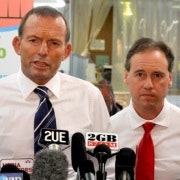Abbott's war on science
When the freshly-minted Prime Minister Tony Abbott declined for the first time since 1931 to appoint a science minister as part of his Cabinet in September last year, he did so having made an election promise four months earlier to “provide the long-term, stable policies and vision that our nation’s scientists and researchers need to excel in their work”.
He then asked scientists to judge the government on its “performance, not by our titles”.
It’s judgement day, and the results -- on the whole -- are not good.
Future fund at a cost
As a medical researcher, I cannot help but be excited by the vision promised by a Medical Research Future Fund as it provides for sustainable long-term funding. I am extremely disheartened, though, by the sacrifices that are proposed for creating this fund.
I am concerned that our future investment in science will be funded by those who rely upon bulk billing to visit the doctor -- those who can least afford it -- and by cuts to Indigenous health support. And removing the preventative health agency is short-sighted. Major pathways to health and well-being depend upon areas that have been cut: prevention, and medical care for the marginalised.
Medical research is not carried out in isolation. It depends on, builds upon and integrates with the work of physicists, chemists, biologists, mathematicians, engineers and many other disciplines.
Many cutbacks
Yet this government has slashed more than $450 million from key science agencies that have all suffered substantial losses, including:
CSIRO -- $111.4 million
Australian Research Council -- $74.9 million
Cooperative Research Centres program -- $80 million
Australian Institute of Marine Science -- $7.8 million
Defence Science and Technology Organisation -- $120 million
Australian Nuclear Science and Technology Organisation -- $27.6 million
Geoscience Australia -- $36 million
These are on top of a $470m decline in funding for science over the previous two budgets. We’re going backwards as other countries move forwards.
Like other forms of research, medical research relies heavily upon PhD students. They form the engine which keeps great research ticking over. Without their work, there can be no new treatments, no breakthroughs in detection and prevention.
Yet this Government has signalled its intention to ask PhD students to pay tuition fees, essentially asking the next generation of scientists to pay to undertake a highly skilled apprenticeship. This will make PhDs unobtainable for many and become a huge disincentive for many more: Australian research will lose its powerhouse.
It’s extremely disappointing to see serious cuts for programs vital to adapting to climate change -- the Australian Renewable Energy Agency and Carbon Capture and Storage Flagships will both suffer, as will the Office of Water Science research program and the Australian Climate Change Science program.
At a critical time in human history -- when we should be doing everything we can to move to a sustainable economy and society -- this seems short-sighted to say the least.
International relations on research
Nor is there any major provision for international science collaboration and diplomacy. The Australia-China Science and Research Fund has been well catered for (which is very welcome) but what of Europe, the Americas and the rest of Asia?
Australia does excellent research -- and certainly holds its own internationally -- but with a comparatively small population of researchers and geographic isolation, we run the risk of missing vital leaps forward if we lack strategic mechanisms to engage with the international research community.
The good news from the budget
There is, of course, some good news for science in the budget. I’ve already mentioned the Medical Research Future Fund, and the Academy is very welcoming of interim funding for national research infrastructure, hoping this will be carried forward as a long-term strategic investment program.
We also welcome new ongoing commitment to the Future Fellowships program for mid-career researchers, and the additional support for Agricultural Research and Development Corporations.
And the Academy is of course grateful for the $5m worth of ongoing funding for science in primary and secondary schools via its catalytic Primary Connections and Science by Doing programs. Harnessing children’s natural curiosity and teaching vital critical thinking skills, these programs will ensure the Australians of the future are well equipped to participate in a knowledge economy.
The long-term pain
In summary, for science this budget lacks any overall long-term strategy.
In 2013-14, total science spending was about $8.6 billion. With no central science portfolio and the science budget itself spread across multiple agencies and portfolios, it’s difficult at this stage to accurately pinpoint the total spend for this year. But it appears on first blush as though it will slip below $8.5bn -- its lowest in five years.
The government says it’s building “a strong, prosperous economy and a safe, secure Australia” and yet it is crippling the research and development needed to build the future it envisages.
Nations with economies in much worse shape than ours are investing more heavily in science, because they recognise that research and development represents the best hope for a healthy population and environment, and a strong and innovative economy in years to come.
We need to increase our research and development investment strategically -- from 2.2 per cent of GDP to at least the OECD average of 2.4 per cent -- and grow it wisely for decades to come.
The commitment to medical research must be matched in the rest of the science sector, or we will not be able to meet Australia’s big challenges. We will not secure a strong and prosperous economy.
![]()
Suzanne Cory is President of the Australian Academy of Science. She receives research funding from the National Health and Medical Research Council.
This article was originally published on The Conversation. Read the original article.
















